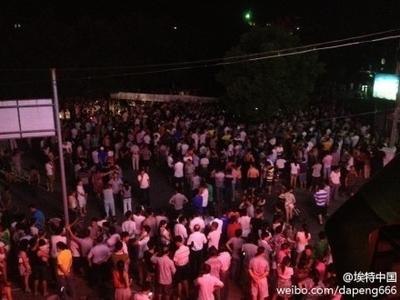The latest case of Chinese urban officers clashing with ordinary citizens has led to the death of a 52 year-old watermelon seller in Hunan Province, after he was hit hard in the skull with a weight from the stall he used to sell his melons. The incident escalated to a bloody confrontation between villagers and more than 200 armed police when authorities attempted to forcibly take away the dead body.
Major Chinese Internet portals and news publications, as well as state media, covered the story closely. On China’s most popular microblogging service, Sina Weibo, the incident was among the most widely discussed topics, with one related search term reaching over 1.5 million posts at the time of writing.
The Chinese public is used to seeing cases of “chengguan,” or urban management officers, using excessive violence when enforcing city regulations, such as beating street vendors and the homeless, but the death of a man seemed to be the last straw for many.
On the morning of July 17, watermelon farmer Deng Zhengjia and his wife Huang Xixi arrived at a main street in Linwu County, Hunan Province, to set up their fruit stand. At around 8am, several chengguan officers who were patrolling the area saw that Deng did not have the proper license and fined him 100 yuan ($16 dollars). The officers also took some watermelons and broke Deng’s scale, according to an Internet post by Deng’s great nephew, Lin Jiechun.
The couple then moved to a different area where they could legally sell their produce. Shortly after they finished setting up their stand at around 10am, a dozen chengguan officers accosted them again, and the two parties began an altercation.
A relative of Deng, who only wished to be identified by his surname Huang, told Epoch Times that a group of officers had punched and kicked Deng. Then, “they hit his [Deng] head with a weight [from the scale], and he fell to the ground and died.” Several eyewitnesses also told Chinese media that before Deng fell to the ground, they saw the officers beating him.
The officers refused to bring Deng to the hospital, and left the scene when they realized the man was dead, Lin said in his post. About half an hour later, an ambulance arrived, but Deng had already stopped breathing, according to a report by the Chinese newspaper, Chongqing Morning Post. Deng’s wife, Huang, was also severely beaten and fainted at the scene. She was later brought to a hospital to treat her injuries.
That evening, the Linwu County propaganda department released a statement saying that Deng suddenly fell to the ground and died while he was involved in an argument with officers.
Another relative, who identified himself with his surname, Deng, told Epoch Times that on the same evening, more than a thousand residents and villagers from the dead man’s home village gathered at the scene and stood guard overnight to protect the body from being taken away. At around 4 a.m., over 200 riot police, armed with electric batons and iron clubs, arrived to remove the dead body.
Deng said, “They injured more than 10 people, even several elderly folks who were over 80 years old. They couldn’t stand up. Many villagers were badly bruised and bloodied, with injuries to the body, feet, hands, waist, or the mouth. My head was beaten and I had to get seven stitches. People who were just standing and watching also got beaten.”
The police eventually succeeded in removing the body, and brought it to the deceased’s hometown of Liantong Village.
Photos of the injured villagers circulated widely online, with many of whom were shown covered in blood on their faces and arms.
On July 19, the Linwu county government website was hacked and a message protesting the local authorities appeared on its homepage, according to a report by the newspaper, Southern Metropolis Daily. The message read: “To the county head who steals dead bodies: committing acts of evil will bring self-destruction!” At the time of writing, the website was down and could not be accessed.
Some netizens expressed loss of faith in the country’s judicial system. A Sina Weibo user with the avatar “Jingzi” posted: “I can only say, I am thoroughly disappointed with this country! There will never be a time when [it] will uphold justice for the people. One must believe this phrase: the people are like the water; they can allow the boat to float, but they can also overturn the boat.”
“When A Spirit Falls In Love” said: “The real world is this frightening. There is a demon in every person’s heart. Because everyone is selfish and only wants to climb higher and higher, and in that process, they constantly swindle and cheat people.”
Protests After Street Vendor Is Killed By Chinese Urban Officers
Chinese urban police killed a street vendor on Wednesday, leading to a bloody confrontation between villagers and riot police.

Local residents gather to prevent the dead body of Deng Zhengjia from being taken away by local authorities. Deng, a watermelon seller, was killed by "chengguan" urban management police in Linwu County, Hunan Province on Wednesday, after an altercation broke out between the two parties. Weibo.com
|Updated:
Annie Wu joined the full-time staff at the Epoch Times in July 2014. That year, she won a first-place award from the New York Press Association for best spot news coverage. She is a graduate of Barnard College and the Columbia University Graduate School of Journalism.
Author’s Selected Articles




